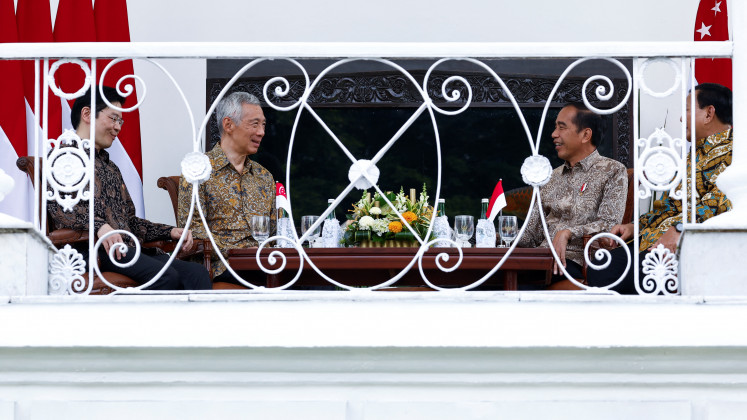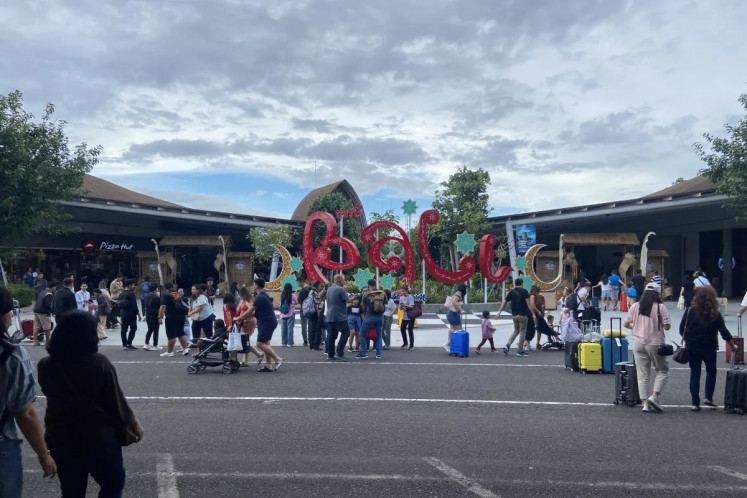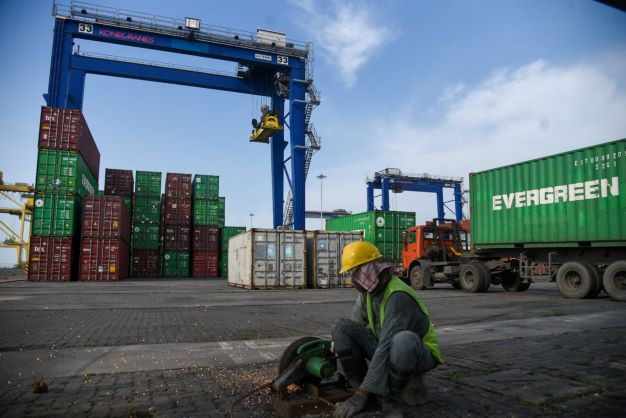Jakarta begins second phase of subway construction
The second phase of the Jakarta MRT rail development project has kicked off with the signing of a contract between city-owned PT MRT Jakarta and Shimizu-Adhi Karya Joint Venture (SAJV), a partnership between Japanese engineering company Shimizu Corporation and state-owned construction company Adhi Karya
Change Size

T
span>The second phase of the Jakarta MRT rail development project has kicked off with the signing of a contract between city-owned PT MRT Jakarta and Shimizu-Adhi Karya Joint Venture (SAJV), a partnership between Japanese engineering company Shimizu Corporation and state-owned construction company Adhi Karya.
MRT Jakarta construction director Silvia Halim and SAJV representative Yutaka Okumura signed the deal, worth Rp 4.5 trillion (US$336.2 million), at the Hotel Indonesia traffic circle (Bundaran HI) MRT station in Central Jakarta.
Phase 2 involves building a 6.3-kilometer track from HI to Kota Station in West Jakarta.
SAJV won the tender for the 58-month initial stage (CP201) of phase 2, which commences in March and is expected to be completed by December 2024.
The CP201 stage involves building a 2.8 km tunnel connecting the Bundaran HI and Harmoni stations in Central Jakarta, as well as the MH Thamrin and National Monument (Monas) MRT stations, with construction breaking ground in 2021.
“This year, we will focus on [preconstruction]," Silvia told reporters after the signing ceremony on Monday. "For instance, site clearance, utility diversions, assessing whether trees should be chopped down or relocated."
“Next year, we will begin tunneling,” she said.
MRT Jakarta president director William Sabandar said that, from the lessons learned in phase 1, it would try and minimize the impact of construction on road users and pedestrians.
“It is highly important for us to improve traffic management during the project's construction. We will install construction barriers that are more convenient for the public, as well as better prevention and management of potential flooding,” William said during the signing ceremony.
The traffic management strategies include temporarily relocating the affected Transjakarta bus shelters on Corridor 1, connecting Blok M in South Jakarta to Kota in West Jakarta. The busway corridor runs adjacent to the planned MRT route in certain areas.
“There will be relocation and adjustment to the existing Transjakarta bus shelters. We are not closing them. The [Bundaran HI MRT station] won’t halt operations, either. Thus, all public facilities will remain operational,” said Silvia.
She added that the pedestrian bridges on Jl. Thamrin and the clock tower at the Thamrin-Kebon Sirih intersection might also be relocated, if necessary.
While the developer would divert traffic on Jl. Thamrin to make way for the project, this was not necessary on Jl. Medan Merdeka Barat in the so-called Ring 1 high-security area.
“The Monas MRT station will be built inside the Monas complex, not on Jl. Medan Merdeka Barat. Therefore, the road won’t be affected,” she said.
Stage CP201 is to proceed simultaneously with the other phase 2 construction stages: the Harmoni-Mangga Besar section (CP202) and the Glodok-Kota section (CP203), as well as the rail track works (CP205) and the rolling stock (CP206).
MRT Jakarta has completed the CP200 stage on building the receiving substation at Monas.
The tenders for the remaining construction packages were underway, but the winning bidders for CP202, CP203 and CP205 were expected to be announced in September, said Silvia.
Seven underground stations are planned for construction during phase 2: Thamrin, Monas, Harmoni, Sawah Besar and Mangga Besar stations in Central Jakarta, and Glodok and Kota station in West Jakarta.
The project is funded by a Rp 22.5 trillion loan from the Japan International Cooperation Agency.
Silvia acknowledged that phase 2 construction would be more challenging because of the soft soil, which required a more robust underground structure.
The planned route would also pass the historical buildings and heritage sites on Jl. Gajah Mada and Jl. Hayam Wuruk, from Harmoni to Glodok, as well as the Batang Hari River that flowed into the Ciliwung.
“We will install a real time monitoring system to ensure that the impact of movement or any disruptions can be quickly identified for repairing,” she added.
William expressed hope that the project would be completed on time and on budget, and that it would be of the best quality.
“More detailed information for the public will be disseminated before the development begins. We apologize to those who might be disrupted by the project,” he said.









